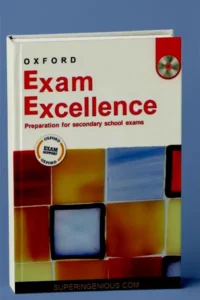Oxford Exam Excellence is an intensive training course to prepare for secondary school exams. It owns Smart comes with an audio CD, which contains all the recordings for the listening tasks.
Oxford Exam Excellence PDF & Audio Free Download at the end of this article.
You can also read: English Verbs
More About The Oxford Exam Excellence Book
Oxford Exam Excellence is an intensive training course to prepare for secondary school exams. There are 12 units that provide practice and exam tasks in Reading, Listening, Use of English, Writing, and Speaking.
All of these skills are practiced at the Bl level (of the Common European Framework), and each unit also contains the extra practice of all skills for students who want to take an exam at a higher level (B2/C1).
Each unit is organized around a central topic, which is then explored from a variety of different viewpoints. The book also has a reference section with a Writing Bank, a Speaking Bank, and a Word Bank.
The Smart answer key at the back of the book explains why the right answers are correct or why the others are wrong. Oxford Exam Excellence comes with its own Smart Audio CD, which contains all the recordings for the listening tasks.
How do I use Oxford Exam Excellence?
The more you use the book, the better prepared you will be for the exam. If you have time to complete the whole course, you will have thorough training in all the typical exam skills and tasks and will cover all the topics and key vocabulary you are likely to encounter in the exams.
You can use any section of the book at any time and in any order you want: you don’t have to work your way through from beginning to end.
If you need flexibility, but still want to get the most out of Oxford Exam Excellence, we recommend the following work plan:
Decide what you want to focus on practicing
Oxford Exam Excellence has a Study Diary on pages 2-3 that is more than just a list of contents: it is also a great tool for planning your own training program.
- If you want to explore an exam topic thoroughly (for example, ‘Science and technology’), check which unit deals with that topic and work your way through the different sections in it.
- If you want to practice a certain skill (for example, Listening), use the Study Diary to find where the various Listening sections are, and choose the ones which focus on the task types you need to work on.
- If you want to train yourself in a certain task type (for example, multiple-choice gap-fill tasks), the Study Diary can tell you which sections feature this task; try to choose a variety of different topics and skills where possible.
Plan your time
Each section tells you roughly how much time you will need to complete it, including the practice exercises as well as the exam task at the end. This is just an estimate to help you with planning; it might actually take you a bit less or a bit more time.
Where there are two different tasks within a Speaking or Writing section, there is an estimate given for the total time to complete both parts (practice and exam tasks), and also a separate estimate for each part, in case you only have time to do one or the other.
The exam box also shows a time, but this is more a suggestion than an estimate: we suggest that you use a watch to time yourself and practice completing the tasks within the time suggested; the times given for the exam tasks closely match the amount of time you would have in the real exam.
Practise
- Focus first on the exercises in a section that prepares you for the exam task. Don’t skip any exercises as they all help you deal more easily with the exam task later on.
- In a few sections, there are follow-up exercises after the exam task. You will find plenty of How to study tips. Use these tips as much as you can.
- Check your answers to the practice exercises in the Smart answer key (a note at the bottom of every page tells you where this is).
- Make a note in the Study Diary of any mistakes you make, so you can make sure you avoid them next time.
Do the exam task
- Always read the instructions carefully to make sure you know what to do.
- Read the Exam tip before you start doing the task.
- When you’re practicing Writing or Speaking, you can prepare for the task by looking at the examples in the Writing Bank or Speaking Bank. Complete the task (and remember to time yourself).
- Before you look at the Smart answer key, check the answers you have written – it’s good practice, and will prevent you from losing points in the exam for small mistakes.
- Read the answers in the Smart answer key and mark your score.
- Record your score in the Study Diary, and add your own notes to remind yourself of things you would like to focus on next time you practice.
Keep track of your progress
Use the Study Diary to:
- make notes about any mistakes you have made after you have finished the practice exercises,
- record your score and make notes on the exam task after you have completed it,
- tick every section you have already done.


